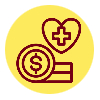Home » Industries Served » Healthcare & Life Sciences
There are numerous upstream and downstream sub-industries within the healthcare sector, making up the wide industry of health and life sciences. This category includes companies that provide healthcare services, such as clinics, hospitals, primary care providers, and therapists. The industry also includes distributors and manufacturers who provide healthcare service providers with equipment and components. Pharmaceutical enterprises and pharmacies, cleaning and sanitation services, industrial laundry and linen supply, medical equipment and device distributors, and medical institutions are important suppliers in this sector. makers of materials, packaging services, and machine shops are suppliers to upstream medical device makers.
End users in Saudi Arabia include patients, insurance providers, and public administration officials because of the country’s healthcare and public administration systems. Right now, the industry is in its expansion phase. It is distinguished by substantial R&D expenditures and quick technical progress. Health Saudi patent rules and regulations are crucial to the growth of the sector, particularly for pharmaceutical firms and medical practices. Regulation of medical suppliers is somewhat less stringent. Over the past five years, the Saudi healthcare and life sciences sector has experienced rapid expansion as a result of rising health care expenditures and an aging population. Additionally, the business has benefited from advancements in diagnostic methods and healthcare infrastructure.
Regulations pertaining to healthcare and overall economic growth are the main drivers of this sector. More precisely, the Saudi Arabian healthcare sector is directly impacted by government spending on healthcare, healthcare innovation, rising consumer awareness, and business earnings.
As more patients need access to healthcare and science continues to advance, this trend is expected to continue. The industry is not affected by pricing or business cycles because of government assistance and health insurance.

The demand for healthcare services and industry participants in Saudi Arabia is strongly linked to government funding allotted to healthcare and associated infrastructure because healthcare is free and supported by the government. Strong economic growth and high tax rates make it easier to spend more on healthcare infrastructure, thus overall economic tailwinds are a big motivator for businesses in this sector.

Online clinics and telehealth have made healthcare services more comfortable and accessible for patients because to the development of better internet infrastructure brought about by services like 5G internet and smartphone technologies. Over the next ten years, this tendency will continue to propel the expansion of healthcare services. These types are very profitable and have low operating overhead. As a result, the industry's healthcare service providers will continue to consolidate.

Consumer awareness is rising as a result of information availability and advancements in medical technology. Customers will continue to adopt better lifestyle choices as the general public becomes more aware of the value of preventative healthcare, which will increase demand for industry participants.

The demand for healthcare services might rise as a direct result of increased business earnings being used to fund employee healthcare benefits. Furthermore, increased taxable revenue and business profits may indirectly increase government spending on healthcare. The healthcare sector is therefore stimulated by robust corporate profitability and business sentiment.

Over the past three years, the average deal size in the Healthcare & Life Sciences sector has increased. The epidemic has exposed gaps in global healthcare capacity and drawn investments in this field. The demand curve for healthcare industry verticals is predicted to be permanently shifted by the dramatic rise in the demand for top-notch medical services, equipment, and products worldwide. Additionally, M&A activity in the healthcare sector is anticipated to continue to be strong as investors’ appetite for risk increases in a low yield environment. BB Capital, the top private market M&A advisory firm in Saudi Arabia, is aware that selling a company is a significant choice. A committed business owner aims to sell their company to a qualified buyer who can carry on the company’s legacy in addition to maximizing the amount of money they can get from the sale.
Understanding certain crucial elements unique to the healthcare and life sciences industry that could affect the possibility of a possible sale is crucial for entrepreneurs and business owners considering a possible sale. These elements influence how appealing a company is to possible investors and buyers.
Investing in research and product development is the most significant cost for businesses creating goods in the healthcare and life sciences sectors. Clinical trials, focus group research studies, and other experiments may be part of this procedure. It frequently takes years and a significant financial outlay in the form of sunk expenses to develop a profitable product, with no assurance of future sales. As a result, businesses in this sector are viewed as extremely dangerous. Investors with complementary product portfolios are drawn to companies having a history of successfully launching items onto the market or conducting successful clinical studies.
Regulation: Manufacturers in this sector are subject to stringent regulations and must go through costly and time-consuming regulatory approval procedures. Therefore, a successful completion of this process can provide an exclusive market for industry participants who pose little threat from competition. Businesses with exclusive patents and other forms of intellectual property are in great demand and can command a high price.
Exclusive Contracts: Businesses that provide highly specialized goods and services frequently depend on suppliers that are exclusive source and have control over the distribution of particular raw materials needed for production. Manufacturers can increase entry barriers and expand a healthcare company’s economic moat by controlling the supply chain and establishing exclusive agreements. Exclusive agreements with specialist suppliers provide distributors with protection against rivalry.
Marketing & Brand Awareness: Marketing expenses are one of the biggest sources of costs for healthcare and life sciences organizations. Players in this market must make significant investments in educating consumers about their products and raising brand awareness among the general public in addition to spending money on R&D and regulatory approvals. A company’s attractiveness increases with the size of the addressable market for its product line.
Whether it’s a sale or a valuation, our team can offer resources and experience that are only available at larger companies, together with the individualized attention of our M&A Advisory team. Reach out to one of our advisors by contacting us right now.
Our Process





Sign up for Alerts, New listings, News and Updates.